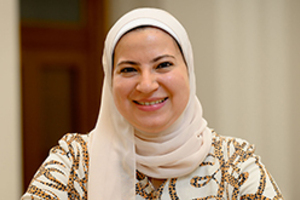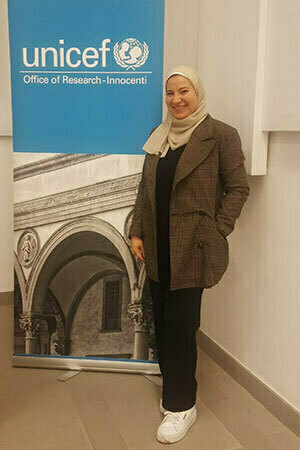
Having recently completed her professional field experience as a second-year master of global affairs, peace studies concentration student, Noha Elsebaie shares how her two internships dovetailed with her research interests and her key takeaways for the future.
What led you to study at Notre Dame?
The University has a strong academic reputation, impressive alumni success, and promising opportunities for strong career connections. The outstanding reputation of the Kroc Institute for International Peace Studies closely aligns with my field of interest, which helped strengthen my confidence in attending Notre Dame.
What led you to peace studies? How did you get connected with the Kroc Institute?
Because I was raised in Egypt, a nation that has experienced diverse conflicts and hosts a significant refugee population, I was naturally steered toward the field of peace studies. Egypt’s intricate geopolitical environment, coupled with the prevalence of refugees, underscored my sense that there is an urgent need for individuals to participate in the peacebuilding sector.
My personal involvement began in 2015, as I explored peacebuilding with a particular emphasis on the growing population of Syrian refugees in Egypt. I experienced firsthand the consequences of conflicts on displaced communities, and this deepened my commitment to making meaningful contributions to peace initiatives and projects.
My initial introduction to the Kroc Institute came through my involvement in the gender and peacebuilding department at the Catholic Relief Services-Cairo office, which is a partner organization with Kroc. I had also heard positive feedback from colleagues at CRS who had previously studied at the Kroc Institute.
Tell us about your six-month professional field placement experience.
I had the privilege of working with two distinct organizations. From July to September 2023, I served as an intern in Women, Peace, and Security (WPS) at Search for Common Ground. My focus was on the global Rapid Response Fund whose primary objective is to provide accessible funds directly to a diverse range of women-led initiatives, responding to emerging crises, and fostering advancements in WPS outcomes in fragile and conflict-affected contexts. I was able to expand my project management skills, and, importantly, the experience provided valuable insights into the complexities of supporting women-led initiatives. We must acknowledge their pivotal role in advancing peace and security objectives.

internship, September 2023
Following that experience, from September to December 2023, I worked with UNICEF Innocenti, the Global Office of Research and Foresight at UNICEF. In this capacity, I served as a fellow within the Gender, Rights, and Protection team. Our collaborative efforts focused on a research paper addressing the intersections of Violence Against Women (VAW) and Violence Against Children (VAC). The overarching goal was to facilitate dialogue between practitioners and policymakers in both the VAW and VAC sectors, contributing to a more comprehensive understanding and effective response to these critical issues. Being part of the team at UNICEF involved in a multinational research study was eye-opening. The process is similar to laying a strong foundation for projects - it involves collecting and analyzing data from three distinct contexts, and ensuring the end product is well-crafted and thus has a better chance of making a lasting impact.
What ideas from your field placement will you carry with you in the future?
For me, the key takeaway for future employment is recognizing the significance of implementing tailored interventions and adaptive strategies to effectively address the distinctive challenges women face worldwide. Recognizing the importance of adopting a participatory approach and involving stakeholders and beneficiaries in the project design and implementation is crucial for impactful outcomes.